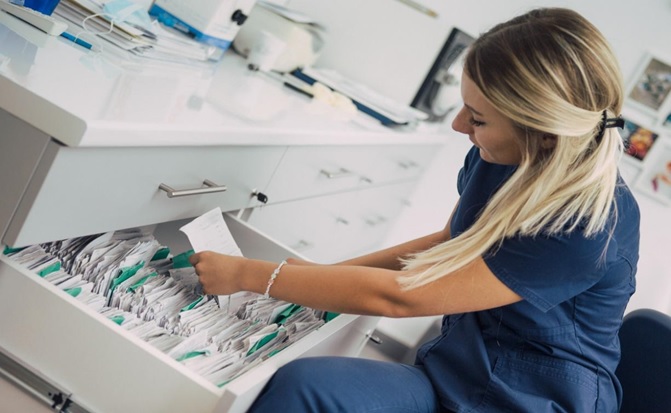
Nursing students taking the Doctor of Nursing Practice in Adult-Gerontology Primary Care Nurse Practitioner (DNP-AGPCNP) are studying at a high level and graduate with advanced nursing and leadership skills. They will have a preceptor and a clinical placement as part of their program. It is an opportunity to practice nursing skills and learn more about assessing and treating patients. The student will decide on their learning objectives while at the placement, and their preceptor will support their aims. The clinical placement gives students an enlightening and educational experience. Students who make the most of their time at the placement will greatly benefit from the experience.
Registered nurses who wish to advance their careers can enroll in the AGPCNP online programs at the University of Indianapolis. The DNP-AGPCNP is a terminal degree that allows students to become health systems leaders and achieve the highest level of proficiency. The university placement team works with students to find a suitable and local clinical placement.
The Bureau of Labor Statistics forecasts that demand for nurse practitioners (NPs) will increase by 46% by 2031. It is a significant increase when compared with other occupations. There are numerous reasons for this growth, including the increased needs of underserved communities, the growing numbers of older people, and how NPs are valued in healthcare and recognized for improving health outcomes.
Gerontological nurse practitioners
Gerontology is the study of the aging process and looks at the effects and causes of age-related illnesses. Gerontological nurse practitioners have a comprehensive approach to care. They examine the biological aspects of aging and the physiological and social aspects of aging. Adult-gerontology primary care nurse practitioners (AGPCNP) care for adults of all ages. This population has particular needs as the body is not developing anymore, and there are age-related changes, including a higher likelihood of infection, reduced bone density, and decreased respiratory strength. They deliver high-quality care with an emphasis on health promotion and disease prevention.
An important part of the nurse practitioner (NP) role is educating patients about maintaining health and preventing disease. AGPNPs have an advanced education that allows them to diagnose and treat chronic and episodic conditions experienced by adults. They arrange diagnostic tests, collaborate with other healthcare professionals, help patients navigate the healthcare system, and refer patients to specialists. AGPCNPs play an essential role in treating patients with complex issues related to chronic conditions and age as the older population becomes larger. They treat chronic diseases, including diabetes, heart disease, cancer, and stroke. Another chronic condition is obesity, which has been linked to certain types of cancer, heart disease, Type 2 diabetes, and stroke.
Clinical placements
Clinical placements provide an opportunity to apply the concepts learned in the classroom to patient care. They are a chance for NP students to work as providers while benefiting from the guidance and supervision of a preceptor. Clinical placement is a key requirement for nursing students. It provides experience in the real world and allows nurses to apply nursing theory in a practical environment. The placements can vary because of the different healthcare environments, such as clinics, hospitals, long-term care facilities, and schools.
When students experience different sites, they gain perspective and experience as nurses and learn more about the career they want. They need to be open to new challenges and ready to work in medical departments outside their field of interest, as this can build skills, experiences, and an understanding of healthcare as a whole. Students are given insight into the work NPs undertake. They can learn quickly, think autonomously and critically, and take on responsibilities. Students can communicate with the staff they will be working with on their placement, decide on their learning objectives, and work to complete their goals. They should be practical from day one and learn as much as possible.
NPs will need to communicate as leaders and monitor the work of their healthcare team. Students can prepare for these responsibilities by connecting with their colleagues and supervisors and observing how they manage their teams. Some universities arrange clinical placements for students. The students will be responsible for communicating regularly with the clinical placement staff to communicate their academic interests and to ensure they have a placement that matches their professional and academic goals. It can be beneficial to see diverse settings, as this can give ideas of areas to work in. The clinical placements are challenging, and students are expected to take responsibility for their learning.
Clinical placements are opportunities to learn more about developing plans of care, patient health evaluations, and coordinating care while working in a healthcare team. Clinical knowledge can be combined with communication skills for patient care and health assessments. Students can learn more about consultation, collaboration, and obtaining evidence-based information for diagnosis and management. They will develop medical care plans, monitor patient treatment, and become clinical decision-makers.
The placement is a chance to practice in a safe environment and become confident and knowledgeable about using reasoning and assessment skills. The students will get practice charting and collaborating with other healthcare professionals. If they can see the same patients while they are being treated, they will benefit from seeing their progress.
The preceptor
During the clinical placement, students are supervised by a preceptor who is an experienced advanced practice nurse. They will guide the student on documentation, processes required, and assessment. They work individually with the student throughout the placement. The preceptor demonstrates the connection between theory and practice and supervises patient care.
The preceptor’s knowledge of the patient population and the clinical area will help guide students as they decide their career pathways. The preceptor shows the students what the working life of an NP in their area is like. The preceptor-student working relationship is beneficial to both. The student learns from the preceptor’s expertise and knowledge, and the preceptor gains extra nursing assistance in the workplace.
As they continue through their clinical placement, NPs will take on more responsibilities and aim to become independent in their work by the end of the placement. The preceptor will provide guidance and evaluations of their work when necessary. When the student starts seeing patients, the preceptor will often observe them until they are ready to see patients independently. Preceptors provide evaluations so students can realize their strengths and weaknesses and be motivated to improve. There will typically be a formative assessment during the placement and a summative assessment when the placement ends.
Learning objectives
The role of the preceptor is to give the students opportunities to reflect on and review their clinical practice, discuss cases in depth, and identify improvements related to safety. Students can decide on learning objectives with their preceptor. Objectives must be SMART (specific, measurable, achievable, realistic, and time-bound) so progress can be tracked and goals are more likely to be achieved.
These objectives can change as time passes, but starting with an idea of the experience, skills, and insights they hope to gain works well. It can help students focus on learning effectively with patients, supervisors, and colleagues. It is easier for the preceptor to support the students when they understand their objectives. Generally, students will spend time in the placement before deciding on their learning objectives. They can select areas where they feel they are weak and others where they are interested in extending their knowledge and getting more experience. Objectives will vary depending on the clinical setting they are working in and where they are in their degree program. Students in the DNP-AGPCNP program are completing advanced study, so they will be given more responsibility at their placement.
Professional development
As well as practicing nursing skills, students can find more information on best practices by attending conferences. It can be a good way to stay up-to-date with the latest advancements in healthcare. Other benefits include networking, professional development, patient safety, risk management, learning about new technology, speakers, and ideas for career goals. Nursing organizations organize conferences and provide opportunities for networking with other nurses and sharing experiences. There will be opportunities to attend workshops for skills requiring additional instruction in subjects like suturing, x-ray interpretation, and incision and drainage.
Reading nursing literature can help you learn new knowledge and stay up-to-date with current practices. Books, websites, and journal articles are primary sources of new information for nurses. Students can use their reference materials while doing their clinical placement. They can look up antibiotics before prescribing and look up a medicine to check the correct dose. It makes sense for students to do this and check what they are prescribing. Over time, this will help them learn more about the medicines and antibiotics they work with.
It can help to carry a notepad to record medical conditions and medications so the student can research them and increase their knowledge. Students interested in a particular topic while at the clinical placement should investigate how to learn more. There might be a specific skill they could learn, like IUD insertion, which would make them a strong candidate for positions. There are conferences on contraceptive technology with training that students could attend to become more skilled. Taking the initiative to shadow experienced staff and other colleagues can be a good way to learn more about the types of nursing that are of interest. Students can also visit or shadow other healthcare professionals outside the scope of their work, such as surgeons or occupational therapists.
Communication
An important part of the NP role is communicating well with patients, supervisors, and colleagues. There is a change from carrying out medical orders to giving the orders and working with a healthcare team to diagnose and make care plans for patients. The student needs strong communication and analytical skills and the ability to assert opinions about the patient’s needs. They must learn how to present clinical findings about a patient by taking detailed medical histories, performing physical assessments, and having plenty of practice. The presentation can involve creating diagnosis lists and
deciding the next steps systematically. Clinical presentations can help support and connect with colleagues. Students can also practice handling difficult conversations with patients and colleagues. They can learn how to manage misunderstandings and negative interactions while maintaining respect.
Students will engage in advanced practice nursing tasks and have questions about what they do. Students can make a note of questions so they can ask them at appropriate times when everyone is not too busy. They should learn from their preceptor and ask questions to improve their interactions with patients. Examples of questions a student might ask include how to care for a difficult patient, use a particular medication, or make a differential diagnosis. Students can learn a lot by asking their preceptor questions and building their own knowledge. It can be beneficial for students to evaluate their day, acknowledge what they did not know, and ask their preceptor for the information they need. This way, the student’s learning is continuous and ongoing.
A worthwhile experience
DNP-AGPCNP students are taking a terminal degree and will have the highest-level nursing and leadership skills. Part of their program involves being assigned a preceptor and a clinical placement. It is an opportunity to build knowledge and skills and learn from the health professionals in their team. Students can make the most of their placement by getting more experience assessing and treating patients, networking, researching, asking questions, taking on new challenges, and achieving learning objectives.
By being attentive, communicative, and willing to learn, students can build the skills required to succeed in their chosen field and forge rewarding professional and personal relationships. Some students find their clinical placement leads to their first job after graduating. If not, a successful placement can make getting job interviews easier. Students who enjoy their placement experience may consider becoming preceptors in the future. The clinical placement will complement the academic study and allow students to develop expertise and succeed in their careers.
















